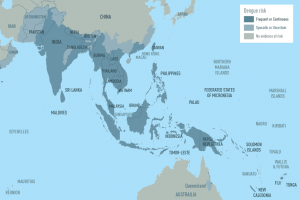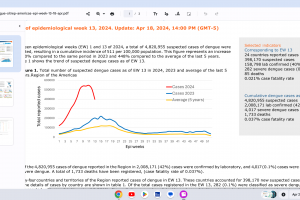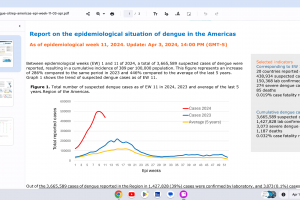Dengue Outbreaks
Dengue Outbreaks 2024
The first suspected dengue-like epidemics were reported in 1635 in Martinique and Guadeloupe. According to the World Health Organization (WHO), Dengue is endemic in about 125 countries in 2024. The WHO reported (DON498) that during 2023, over 5 million dengue cases and more than 5,000 related deaths were reported by over 80 countries/territories and five WHO regions: Africa, Americas, Southeast Asia, Western Pacific, and Eastern Mediterranean. This data indicates an increase of over 30% in dengue cases and associated deaths in 2023 compared to 2022. As of 2024, the WHO does not recommend general travel or trade restrictions be applied to countries or territories/areas reporting dengue outbreaks based on the available information. The WHO says Dengue is endemic in most countries of South America, Central America, and the Caribbean.
On Apr. 18, 2024, the Pan American Health Organization (PAHO) issued an Epidemiological Alert regarding the sustained circulation of Dengue in the Region of the Americas in 24 countries in 2024. Situation Report No. 14 confirmed that 4,820,955 suspected cases of Dengue (an increase
of 260% from 2023) and 1,733 deaths have been registered as of week #13. In 2023, there were 4,565,911 dengue cases, including 2,340 deaths (case fatality rate of 0.051%) reported by the PAHO.
The U.S. Centers for Disease Control and Prevention (CDC) reported in April 2024 that 37 jurisdictions have reported 929 dengue cases. During 2023, there were 2,343 dengue cases reported by 52 U.S. jurisdictions. The CDC has issued Travel Health Notices regarding dengue outbreaks in the Americas (Apr. 18, 2024), Africa/Middle East (Apr. 18, 2024), Costa Rica, and Asia/Pacific Islands (Apr. 18, 2024). The CDC says Dengue is endemic in the U.S. territories of Puerto Rico, American Samoa, the U.S. Virgin Islands, the Federated States of Micronesia, the Republic of Marshall Islands, and the Republic of Palau.
Dengue Outbreak United States
The U.S. Centers for Disease Control and Prevention (CDC) reported in April 2024 that 37 jurisdictions reported 929 dengue cases in 2024. In 2023, 52 U.S. jurisdictions reported 2,343 dengue cases. In 2024, the Florida Health Department (FDH) reported travel-associated and locally acquired dengue cases. In March 2023, Puerto Rico's Department of Health confirmed Dengue was endemic. The Texas Department of State Health Services (DSHS) says the mosquito that transmits dengue fever is found in Texas, so there is a potential risk for dengue transmission and sporadic outbreaks.
Dengue Outbreaks Africa
The CDC reported on January 22, 2024, that travelers visiting these African countries may be at increased risk: Burkina Faso, Cape Verde, Côte d'Ivoire, Ethiopia, Mali, Senegal, and Sudan. In 2023, 171,991 dengue cases and 753 deaths were reported in African countries. Dengue circulation has been detected in more than 30 African countries. The U.S. CDC issued a Travel Health Notice in 2023, confirming Dengue is an ongoing risk in Africa.
Dengue Outbreaks Region of the Americas
As of April 2024, 3,665,589 suspected dengue cases were reported in the Americas. The U.S. CDC reported in 2024 that countries in the Americas have severe dengue cases, including Argentina, Cuba, Honduras, Colombia, Panama, Paraguay, the Dominican Republic, Guatemala, Grenada, Puerto Rico, the U.S. Virgin Islands, and the British Virgin Islands. The Pan American Health Organization (PAHO) (Feb. 16, 2024) and the WHO have issued dengue travel advisories and Risk Assessments.
Up to EW #5 of 2024, 45,985 suspected Dengue cases were reported in the Andean subregion, a decrease of 8% compared to the same period in 2023. However, they are 63% above the last 5-year average in the subregion. The Republic of Peru's health ministry declared a dengue disease emergency on Feb. 26, 2024, for 20 of the country's 25 regions. In 2024, about 20,000 dengue cases were registered in Argentina, a 61% increase from the National Epidemiology Bulletin (N 687 SE 2).
As of March 2024, Brazil reported over 1 million dengue cases. The Brazilian Ministry of Health reported dengue cases among pregnant women in 2024 reached 5,151 in the first six weeks, compared to 1,157 in the same period in 2023. In 2023, Brazil reported about 2.9 million patients, a one-year increase of 20%. In 2023, Rio de Janeiro reported 22,959 dengue cases.
According to the Republic of Costa Rica Health Surveillance Directorate, 1,076 dengue cases were reported in 2024. Costa Rica confirmed over 24,000 dengue cases in 2023, with the Huetar Caribe and Central Sur regions presenting the most cases. As of August 4, 2023, all four dengue serotypes were registered.
Dengue transmission has been documented in Yucatan, Mexico, since 1979. During the first five epidemiological weeks of 2024, a 368% increase in dengue cases was reported compared to the same period in 2023. The states that reported the most cases were Quintana Roo (Cancun), Tabasco, and Guerrero. The cumulative incidence rate at EW 5 is 14.7 cases per 100,000 population. Dengue was reported in 28 of 32 Mexican states in 2023.
As of December 31, 2023, the PAHO reported continuing widespread transmission of dengue fever in the Caribbean in 2023. The Caribbean reported over 62,000 dengue cases in 2023, a significant increase from 20,349 cases in 2022. The PAHO reported 2,050 deaths due to Dengue, resulting in a case fatality rate of 0.049% for 2023.
Jamaica's Ministry of Health declared a dengue outbreak on September 23, 2023. To date, there have been 1,060 confirmed dengue infections in Jamaica. All parishes have recorded dengue cases, with Kingston and St. Andrew, St. Thomas, St. Catherine, Portland, and St. James recording the most confirmed cases.
Dengue Outbreaks Asia and Pacific Islands 2024
The U.S. Centers for Disease Control and Prevention (CDC) reported in 2024 that the countries listed in the WHO Western Pacific Region are reporting higher-than-usual numbers of dengue cases, and travelers visiting these countries may be at increased risk: Bangladesh, Cambodia, Malaysia, Philippines, Sri Lanka, and Thailand.
Singapore's National Environment Agency launched the National Dengue Prevention Campaign on March 31, 2024. Over 5,000 dengue cases were reported in the first quarter of 2024, more than double the 2,360 cases reported in the same period last year.
Thailand's Bureau of Epidemiology reports 13,347 total dengue fever cases from January to February 14, 2024. Thailand's Bureau of Epidemiology, Department of Disease Control, reported 153,734 total dengue cases in 2023, a 231% increase compared to 2022. The dengue death rate in Thailand increased from CFR 0.07% to CFR 0.11% in 2023.
In January 2024, French Polynesia confirmed between January 15 and 18, three new dengue cases were detected, placing the situation at a level 2 alert.
On December 28, 2023, the WHO published a Southeast Asia Dialogue, Update #664, highlighting a 30-fold increase in dengue cases in the region. Dengue is an ongoing risk in Australia, Bangladesh, Cambodia, India, Laos, Malaysia, Maldives, Myanmar, Pakistan, Philippines, Singapore, Sri Lanka, Taiwan, Thailand, and Vietnam.
In 2023, Taiwan's CDC recorded 20,363 domestic dengue cases, 17,962 in Tainan and 1,208 in Kaohsiung. Taiwan CDC physician Lin Yung-ching stated on October 17, 2023, that a case of mother-to-infant transmission of Dengue was confirmed, affecting a five-day-old boy. This was the second case this year and the third ever in Taiwan.
During 2023, Bangladesh reported 321,179 dengue cases and 1,705 deaths, its worst-ever dengue outbreak. According to Bangladesh's Directorate General of Health Services, of these dengue cases, 63% of patients and 62% of deaths were reported in July 2023. The WHO reported that from January to August 7, 2023, the dengue case fatality rate (CFR) was 0.47%. As of December 2022, a total of 274 related fatalities (CFR 0.44%) were reported by the Ministry of Health & Family Welfare of Bangladesh in 2022. According to a Bangladesh Sangbad Sangstha report in 2019, 179 deaths were reported.
In Kerala, India, a December 2023 study reported the actual burden of Dengue exceeds the reported numbers. The hyperendemic situation suggests the need for region-specific and targeted interventions, including vaccination. Recent studies have reported overall seroprevalence rates of 48·7 % (95 % CI 43·5–54·0) and 29% (95% CI 24.1–33.9) in children. Since 2000, genotype III of DENV-1, the cosmopolitan genotype of DENV-2, genotype III of DENV-3, and genotype I of DENV-4 have dominated India. Moreover, the DENV-4-Id is drifting towards DENV-1 and DENV-3 clades, suggesting the role of cross-reactive antibodies in its evolution. The observed emergence of the non-Indian lineage of DENV-2 in Bhopal, which again is the first report from the area, coincides with the gradual increase in DENV cases in Bhopal since 2014. As of June 11, 2023, Mumbai has reported 386 dengue cases, accounting for 31% of all registered cases in 2023. The WHO published Dengue Situation Report # 1 on August 28, 2023, confirming Dengue is endemic in Bangladesh, with yearly increases and peaks reported around the monsoon season. Save the Children reported in October 2023 that about 225,000 cases have been reported in the current outbreak, more than 38,000 of them children, with at least 113 pediatric deaths reported.
Sri Lanka's National Dengue Control Unit Director, Dr. Nalin Ariyaratne, reported 66,500 dengue cases with 39 related deaths in 2023.
Local media in Tahiti reported a new locally acquired dengue case in Mahina in January 2024, this time in a person who had not recently traveled. Health authorities elevated Tahiti to a level 2 dengue alert. French Polynesia has not experienced local dengue virus circulation since 2021.
Dengue Outbreaks Eastern Mediterranean Region
Dengue and severe dengue epidemics were first reported in the WHO's Eastern Mediterranean Region in 1998. Dengue outbreaks occur in all nine endemic countries: Afghanistan, Djibouti, Egypt, Oman, Pakistan, Saudi Arabia, Somalia, Sudan, and Yemen.
Dengue Outbreaks Europe
Dengue is not endemic in the WHO European Region. In 2023, the European Centre for Disease Prevention and Control (ECDC) reported in 2023 autochthonous/non-travel-associated dengue cases in Europe in Italy (72), France (41), and Spain (3). From May through October 2023, Public Health France reported 36 indigenous cases of dengue fever. According to Santé Publique France, these cases were recorded in Paca, Occitanie, and particularly in Auvergne Rhône-Alpes. As of October 30, 2023, 68 confirmed locally transmitted dengue cases have been reported in Italy, in the province of Lodi (2 cases), and in sections of the metropolitan city of Rome. Also, 230 travel-related dengue cases have been reported.
Dengue Outbreaks Maps
As of 2024, HealthMap, the U.S. CDC, and the ECDC published dengue case maps. A recent study published by the Royal Society indicates that dengue-carrying mosquitoes are expanding their range by an average of 6.5 meters of elevation and have moved polewards by 4.7 km annually.
Dengue Disease
Dengue is a disease caused by a virus spread through mosquito bites. The disease can take up to 2 weeks to develop, with illness generally lasting less than a week. Without treatment, severe dengue can become fatal. New research has identified pre-existing anti-DENV IgG antibodies responsible for Dengue's increased deadliness upon second exposure. "We definitively proved that it's not the presence of dengue antibodies that are a problem, but the quality of those antibodies," says Stylianos Bournazos, a research associate professor in the laboratory of Jeffrey Ravetch, the Theresa and Eugene M. Lang Professor at Rockefeller University in New York.
Dengue Infected Pregnant Women
The CDC confirms a pregnant woman already infected with Dengue can pass the virus to her child during pregnancy, and there has been one documented report of Dengue spread through breast milk. A study published in the American Economic Journal: Applied Economics in April 2024 confirmed robust evidence for the negative effect of dengue infections on birth weight and documented increases in children's hospitalizations and medical expenditures for up to three years after birth.
Dengue Vaccines
According to Brazil, the U.S. CDC, WHO, and the European Medicines Agency, Dengue is a vaccine-preventable, vector-borne infectious disease. Information on authorized dengue vaccines (Qdenga and Dengvaxia) and vaccine candidates can be found at PrecisionVaccinations.com.





